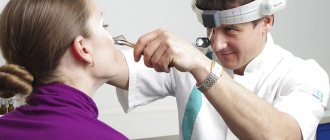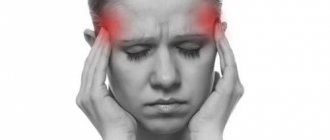Useful articles
Before giving advice on how to relieve a headache from a “hangover,” you should briefly understand the possible variants of this condition. So, what is a “hangover” and how does it manifest itself?
Against the background of excessive alcohol intake, the following may develop:
- A “hangover” in ordinary people is, in fact, simply alcohol poisoning, which is caused by an overabundance of alcohol-containing drinks. It manifests itself as weakness, nausea, vomiting, headache, palpitations, increased blood pressure, and exacerbation of the manifestations of existing chronic diseases is also possible;
- “hangover”, or hangover (withdrawal) syndrome in persons with stage II of chronic alcoholism. The patient experiences severe tremors in the body (especially in the hands and tongue), pallor, sweating, inability to concentrate, impaired speech, coordination, fears, insomnia, timidity, nightmares and hallucinations. This condition is experienced very painfully.
An important distinguishing feature is that the “hangover” of the second option never has nausea, vomiting and aversion to alcohol.
Why do you get a headache after drinking alcohol?
Everyone knows that alcohol is harmful, and most have already seen this from their own experience - according to foreign studies, the most common cause of headaches is alcohol poisoning. There are several reasons why you get a headache after drinking alcohol, and the appearance of unpleasant sensations is not always associated with the quantity and quality of what you drink.
Causes of headaches after drinking alcohol
Headache, vomiting and other signs of a hangover appear in all alcohol lovers several hours after drinking alcohol, but the severity of these symptoms depends on many factors, the main ones of which are individual sensitivity to alcohol and general health. Therefore, in youth, alcohol abuse is more easily tolerated, and some people do not experience any unpleasant sensations at all, even after drinking too much the day before. But gradually the body’s resistance decreases, and a headache appears even after a couple of cans of beer.
Headache after drinking alcoholic beverages occurs due to the direct and indirect effects of ethyl alcohol on the brain.
After alcohol enters the body, it acts directly on the nervous system, causing its depression. Initial motor and speech excitation is replaced by sharp inhibition and general depression of all brain functions, mainly due to a lack of oxygen in the body. Alcohol, combining with blood cells, disrupts normal gas exchange in tissues, which causes oxygen starvation in the brain. Cells of the cerebral cortex, extremely sensitive to the lack of oxygen, begin to die, and intracranial pressure increases several times, as the body urgently needs to remove the dead cells. An increase in intracranial pressure becomes a consequence of the direct effects of alcohol on the brain, causing severe headaches, nausea and vomiting that occur the morning after drinking alcohol. Moreover, the stronger the headache, the more nerve cells died due to drinking. So the expression “drank my brains on drink” can be considered quite accurate and scientifically based, because the cerebral cortex is responsible for human intellectual abilities and higher nervous functions, and nerve cells, as is known, are not restored.
Other indirect causes of headaches include:
- general intoxication of the body - when alcohol enters the liver, it blocks blood purification processes, as a result of this, all toxic substances enter the body, causing severe intoxication;
- an increase in the concentration of acetaldehyde - a breakdown product of alcohol - acetaldehyde is a strong poison for the body; when it enters the blood, it causes disruption of the cardiovascular, nervous, respiratory and other systems;
- dehydration - alcohol “expels” water from the body, it splits water from organic and inorganic compounds, causing severe dehydration, which further disrupts gas exchange processes and aggravates oxygen starvation;
- metabolic disorders - alcohol reduces the pain threshold by affecting the production of prostaglandins, this is what explains the “exploits” of drunks, who act practically without feeling pain, but the next day the synthesis of prostaglandins increases, and the pain threshold increases greatly;
- effect on blood vessels - alcohol causes vasospasm, increases blood pressure, and then swelling and inflammation develop in tissues and organs, which also leads to headaches;
- carbohydrate starvation - due to the negative effect of alcohol on the liver, the production of glucose, the main source of energy, is disrupted, to which, as well as oxygen starvation, the brain reacts most sharply.
What to do if you have a headache
There are many reasons why a headache may occur after drinking alcohol, and all of them simultaneously affect the human body, but there are much fewer ways to cope with unpleasant sensations. The main goal of such treatment is to restore the normal balance of electrolytes in the body and rid it of alcohol breakdown products as quickly as possible.
To do this at home you can:
- Drink as much liquid as possible - cucumber or cabbage pickle, chicken broth or just water help well, with dissolved aspirin tablets - 2 tablets per 1 liter of water;
- Apply a cold compress or wet your head with cold water - cold constricts blood vessels and reduces tissue swelling;
- Taking medications with succinic acid is an effective and safe remedy to help cope with a hangover. Succinic acid protects the liver, accelerates the elimination of toxic substances and quickly restores the body's spent energy reserves. To reduce the symptoms of alcohol poisoning, it is enough to drink 100 mg of the drug and repeat the dose after 50-60 minutes, the maximum dose should not exceed 600 mg of the drug per day;
- A cold douche or contrast shower will help relieve swelling and speed up the removal of toxins through the skin;
- Activated carbon - 1 tablet per 10 kg of weight will help reduce the absorption of toxic substances in the intestines and alleviate the general condition of the patient;
- If the headache does not calm down after all of the above remedies, you can take a painkiller along with an antispasmodic, for example, ketones, nemisulide or paracetamol with no-shpa.
Headache with hangover treatment
We will not consider the option of eliminating binge drinking and eliminating abstinence in alcoholics. In this case, specialized medical care is needed. At home, all alcoholics relieve headaches and other manifestations of a “hangover” by taking a small dose of alcohol. Ordinary alcohol poisoning can be treated at home. When treating headaches after alcohol, accompanied by nausea and vomiting, it is important to rinse the stomach after drinking 1-2 liters of water. This procedure will help remove from the body the breakdown products of alcohol (acetaldehydes) remaining in the stomach, which cause clinical manifestations of poisoning. Taking 0.5 g of Acetylsalicylic acid helps relieve headaches from alcohol.
To alleviate the condition:
- you should take a contrast shower;
- it is necessary to create an enhanced drinking regime: mineral water, natural lemonade, herbal teas, rosehip decoction, apple cider vinegar with water, in proportions 1:2. Before taking apple cider vinegar, you should eat a tablespoon of honey;
- if there is no nausea and vomiting, you should eat warm vegetable soup and sour cream;
- The removal of toxins is well helped by taking adsorbents - Activated carbon;
A hangover in the treatment of headaches from alcohol is relieved with cucumber or tomato brine, fermented milk products, and sauerkraut juice. Simply by eating pickled cucumbers. By neutralizing the effect of acetaldehyde, these products help reduce the intensity of headaches. In case of increased blood pressure (BP) accompanied by headache, you should take a medicine that helps lower blood pressure. For alcoholic excesses, the best group in this case is diuretics. It is better to check the dose and name of the drug with your doctor. There is a widespread misconception among people that taking a small dose of alcohol the next day after massive previous alcoholism quickly relieves the hangover and headache. This is a dangerous misconception. For an ordinary person who does not suffer from alcoholism, a morning “medicinal” portion of alcohol against a background of poisoning will cause vomiting and aggravate the condition. If the patient still manages to drink, he will simply experience a new state of intoxication, which will not make it any easier. Please note: Only patients with chronic alcoholism get better from drinking alcohol.
Treatment of headaches from alcohol can be carried out either separately by each of these methods, or in combination - until the effect is achieved. It is important to remember that the best prevention of this problem is sobriety, or very moderate consumption of alcoholic beverages. Then there will be no hangover or headache.
The text was checked by expert doctors: Head of the socio-psychological service of the Alkoklinik MC, psychologist Yu.P. Baranova, L.A. Serova, a psychiatrist-narcologist.
CAN'T FIND THE ANSWER?
Consult a specialist
Or call: +7 (495) 798-30-80
Call! We work around the clock!
Signs of alcohol intolerance
The symptoms that will be listed below indicate that the body rejects not only the alcohol itself as a chemical substance, but also the alcohol in which it is contained, as well as the additives included in this alcohol. Naturally, in such a situation, it is best to completely abstain from alcohol or reduce its consumption to a minimum. If you feel bad only after one type of alcohol, try replacing it with another. In any case, watch your reaction.
- It becomes bad even after the first drink.
Naturally, after prolonged or extensive use, anyone will feel ill. But, if even the first glass or sip of alcohol causes discomfort and you feel ill, then this is precisely an indication of intolerance to alcohol and the components it contains.
- Nausea and vomiting
Just as with the first sign, this symptom occurs if you drink a lot. But when you start to feel sick and vomit again after the first drink, this indicates alcohol intolerance.
- Increased gas formation
For some people, drinking alcohol causes increased gas formation and abdominal pain even after the first drink, and this phenomenon occurs on a regular basis and is in no way related to food intake. This indicates that your liver, pancreas and intestines cannot tolerate alcohol.
- Diarrhea or vice versa, constipation
Everyone who drinks alcohol frequently and a lot has problems with the intestines and stool in particular. But if you ran to the toilet a short time after your first drink, then you cannot tolerate alcohol.
- Redness of the skin
Redness of the face and neck is the most common and common sign of alcohol intolerance, which indicates that there is very little or no alcohol-degrading enzyme. This phenomenon occurs immediately as soon as even a small dose of alcohol enters the body. Moreover, intoxication itself also comes very quickly, again from the first glass.
- Cold symptoms
There is a substance in our body called histamine. It is involved in the development of allergic reactions. And a stuffy nose and snot are like a manifestation of the allergic reaction itself. When you are intolerant to alcohol and it enters the body, a large amount of histamine is released, as the body perceives alcohol as a threat and tries to protect itself from it. And histamine itself can also be contained in alcoholic drinks, in beer, for example, as a natural by-product of fermentation.
- Headache
Again, if you drink a lot, everyone will have a headache. This is due to under-oxidized alcohol breakdown products, high blood pressure, etc. But... with alcohol intolerance, this does not develop during the hangover period, but much earlier, almost after the first drink, and can develop into a real migraine.
- Development of edema and appearance of rash
Again, we can swell in the morning when we have a hangover. But, if after a small amount of alcohol consumption the face, arms and legs in particular begin to swell, this indicates alcohol intolerance. This is due to sulfites, which are used as a preservative.
- A sharp decrease in blood pressure
If, with a small amount of alcohol consumption, you experience severe weakness, dizziness and a decrease in blood pressure, this already indicates serious disorders in the body, and not just alcohol intolerance. In this situation, it is better to consult a doctor.










